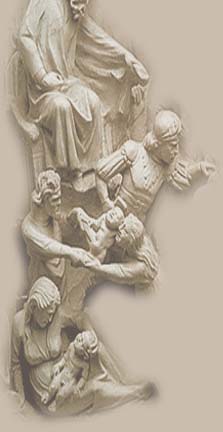| |
Mongol expansion
The story of the 1200's is largely that of Mongol military expansion.
In Mongolia as the century opened, a chieftain named Temujin emerged
from poverty and adversity to unify the Mongol people and earn the
title Genghis Khan, the universal ruler. Between 1206 and 1227, Genghis
Khan and his Mongol armies imposed their rule in central Asia, Manchuria,
northern China, and Persia. Descendants of Genghis Khan later gathered
Tibet, southern China, and Russia under the Mongol canopy. They also
launched invasions of Japan, Vietnam, Cambodia, Burma, Java, Poland,
Hungary, and Germany, though they failed to establish Mongol rule
in those lands.
Economic hardships
Mongol campaigns and conquests have caused hardship throughout many
lands. The populations of China and Persia have dwindled as war
and economic disruption claimed millions of lives. Agricultural
production also has fallen, especially in Persia, where Mongols
destroyed delicate irrigation systems.
Talk and trade
Yet, from the outrages of the Mongols' violent imperialism has bloomed
trade and communication. The Mongols hold merchants, missionaries,
diplomats, and other travelers in high esteem, and they have protected
the silk road that links China to the eastern Mediterannean. Marco
Polo is only one of the hundreds or perhaps thousands of European
travelers who have visited Asian lands during the Mongol era. |

